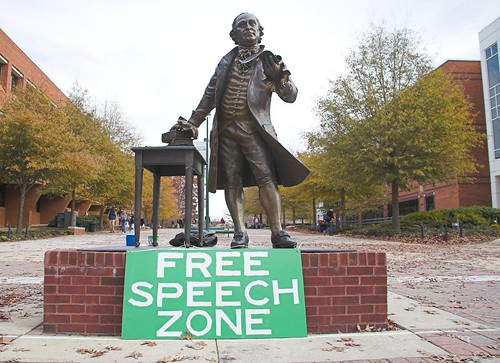College students challenge speech codes
 When you are declared in violation of a speech code in America, do you have the right to speak up and challenge it?
When you are declared in violation of a speech code in America, do you have the right to speak up and challenge it?
These companion cases aren’t just about the free speech rights of students, they’re over the right of students to fight policies that muzzle speech.
One case involves a lawsuit that began when a professor at Los Angeles City College in California called a student a “fascist bastard,” accused him of offending others, and wrote “Ask God what your grade is” on his speech evaluation after he spoke about his faith and the meaning of marriage during an assigned classroom speech. The other case involves a pro-life student group at the University of Maryland-Baltimore County that was forced to move a display to a deserted location on campus because it might “emotionally harass” students.
In both instances, the students were threatened with punishment under the speech code, and both cases address the ability of students to challenge the constitutionality of those codes.
Yes, this is where we are.
The Alliance Defense Fund states the obvious.
“Christian and pro-life students should not have to suffer under unconstitutional speech codes and risk their academic careers before they can challenge such policies in court,” said ADF Senior Counsel David French. “We hope the Supreme Court will intervene to uphold students’ First Amendment protected rights and establish that students have the legal right to challenge speech codes that muzzle their speech.”…
As the petition in one of the cases explains, “In a campus environment rife with speech-restrictive policies, this split threatens to (further) stifle the marketplace of ideas on campus and cause college students to self-censor rather than risk punishment under various–and manifestly unconstitutional–speech policies. This Court should intervene to clear up the confusion and confirm a simple proposition: a student whose speech is chilled by the speech code of the university he or she attends has standing to challenge it to vindicate the First Amendment.”
To say the least.

